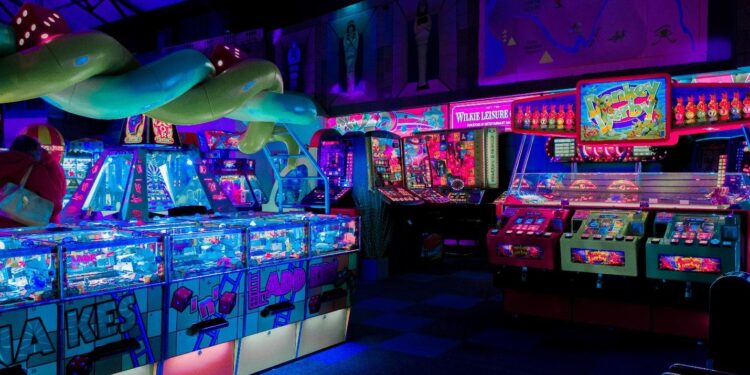The landscape of leisure and amusement has undergone a dramatic transformation over the past few decades, largely driven by the relentless march of digital technology. What began with the simple, pixelated graphics and repetitive jingles of early arcade games has blossomed into a vast and intricate ecosystem of modern online platforms, offering an unparalleled diversity of entertainment experiences. This journey, from the dimly lit, coin-operated cabinets to the globally interconnected digital realms we inhabit today, is a fascinating study in technological innovation, evolving consumer preferences, and the ever-present human desire for engagement and enjoyment.
The Golden Age of Arcades: Laying the Foundation
The genesis of digital entertainment can be traced back to the smoky arcades of the 1970s and 1980s. These were the cathedrals of early interactive digital experiences, where the clang of quarters and the excited shouts of players formed a unique and vibrant soundscape. Games like Pong, Space Invaders, and Pac-Man were not just novelties; they were cultural phenomena.
These early titles, with their rudimentary graphics and simple yet addictive gameplay loops, captivated a generation and laid the foundation for the interactive entertainment industry we know today. The social aspect of the arcade, where friends gathered to compete for high scores and share in the thrill of the game, was also a crucial element of this era.
The Rise of Home Consoles: Entertainment in the Living Room
The advent of home consoles in the late 1970s and 1980s, with systems like the Atari and Nintendo Entertainment System, marked a significant shift. Digital entertainment moved from a communal, out-of-home experience to a more personal and accessible one.

Families could now enjoy a growing library of games in the comfort of their living rooms. This era saw the rise of more complex narratives and gameplay mechanics, pushing the boundaries of what was possible with the available technology. Franchises that would become cornerstones of the gaming world, such as Super Mario Bros. and The Legend of Zelda, were born during this period.
The Personal Computer Enters the Fray: Deeper and More Complex Experiences
The personal computer also emerged as a significant platform for digital entertainment. While initially focused on productivity and education, the increasing power and graphical capabilities of PCs opened up new avenues for gaming. Genres like strategy games, role-playing games, and adventure games found a natural home on the PC, offering deeper and more intricate experiences than their console counterparts. The rise of the internet in the mid-1990s was the next major inflection point, connecting players in unprecedented ways and paving the way for the modern online era.
The Internet Revolution: Connecting Players and Content
The internet revolutionized digital entertainment, giving rise to massively multiplayer online games (MMORPGs) that allowed thousands of players to interact in persistent virtual worlds. Games like World of Warcraft and EverQuest created online communities and offered experiences that transcended the limitations of single-player or local multiplayer games. The internet also facilitated the growth of online video platforms, transforming how people consumed visual entertainment, moving from scheduled television broadcasts to on-demand streaming services like YouTube and Netflix.
The Modern Online Ecosystem: A Diverse Digital Playground
In this landscape of interconnected digital experiences, various forms of online entertainment have flourished. One such area is online gaming platforms that offer a diverse range of activities. Within these platforms, users can find everything from casual puzzle games to complex strategy simulations, and yes, even opportunities to engage with games of chance.
For instance, the digital evolution has also brought about online versions of traditional casino games, including what are known as real money pokies, particularly popular in regions like Australia. These digital adaptations offer the familiar thrill of spinning reels and the potential for monetary rewards, all within the convenience of an internet-connected device. This segment represents just one facet of the vast and varied entertainment options available in the modern online ecosystem.
The Mobile Gaming Boom: Entertainment in Your Pocket
The rise of mobile gaming in the 21st century has further democratized digital entertainment. Smartphones and tablets have become ubiquitous, putting powerful gaming devices in the pockets of billions worldwide.

Mobile games cater to a wide spectrum of tastes and play styles, from short, casual games perfect for commutes to more immersive and graphically intensive experiences. The accessibility and affordability of mobile gaming have significantly expanded the reach of digital entertainment.
Looking to the Future: Immersive and Interconnected Experiences
Today, digital entertainment is a multifaceted and constantly evolving industry. It encompasses not only video games across various platforms but also streaming services for music and video, interactive social media experiences, virtual and augmented reality applications, and the burgeoning world of esports. The journey from the simple joys of early arcade games to the complex and interconnected online platforms of today highlights the incredible power of technological innovation to shape how we spend our leisure time and interact with each other in the digital age. As technology continues to advance at an exponential rate, the future of digital entertainment promises even more immersive, interactive, and personalized experiences that we can only begin to imagine.





























































